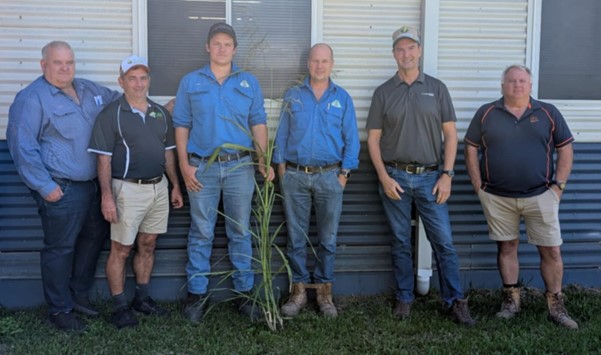


Local organisations are calling on growers and residents to remain vigilant as the spread of Wild Sorghum and Itch Grass continues to threaten the Burdekin’s sugarcane industry.
Both weeds are difficult to identify in their early stages, often resembling sugarcane, and are extremely hard to control once established. Itch Grass, in particular, is listed as a declared pest under the Biosecurity Act 2014, requiring all landholders to take reasonable steps to destroy it if found on their property.
Queensland Cane Agriculture & Renewables (QCAR) Burdekin District Manager Angelo Licciardello said the weed’s aggressive nature and prolific seed production make it a major concern for local growers.
“Itch Grass can overtake cane paddocks very quickly. Its seeds are easily spread by wind, animals, machinery and soil movement, so early identification and control are essential,” Mr Licciardello said.
Wild Sorghum has also become increasingly problematic across the district. While native wild sorghum species naturally occur in Australia, introduced or hybrid types — such as Sorghum halepense (Johnson Grass) — can act invasively in cropping areas, competing with sugarcane and significantly increasing control costs.
Growers and community members are encouraged to help limit the spread by:
Burdekin Productivity Services (BPS) and Sugar Research Australia (SRA) are working closely to combat the issue. Current SRA research is focused on identifying the most effective herbicide options and exploring advanced technologies, such as camera sprayers that can detect and target weeds within cane rows — reducing both chemical use and costs.
Meanwhile, BPS staff are actively monitoring known weed hotspots and are offering a subsidy program to assist growers with control efforts. Producers are encouraged to contact the BPS office for further details on available support.
To strengthen local coordination, a Biosecurity Committee is being established, bringing together representatives from BPS, SRA, QCAR, Kalagro, CANEGROWERS Burdekin, and Burdekin Shire Council. The committee will focus on prioritising resources and developing strategies to effectively manage biosecurity risks across the district.
Burdekin Shire Mayor Pierina Dalle Cort said collaboration is crucial in protecting the region’s agricultural future.
“Our region’s prosperity relies on strong partnerships between Council, industry and landholders. By working together, we can stay ahead of invasive weeds and protect our farming future,” Mayor Dalle Cort said.
For more information on identifying or managing Itch Grass or Wild Sorghum, contact Burdekin Productivity Services on (07) 4783 1101.
Allan Parker (Kalagro), Angelo Licciardello (QCAR), Jack Edwards and Rob Milla (BPS), Greg Watson (CANEGROWERS) and Terry Granshaw (SRA) with wild sorghum from a local cane paddock (Photo Supplied)